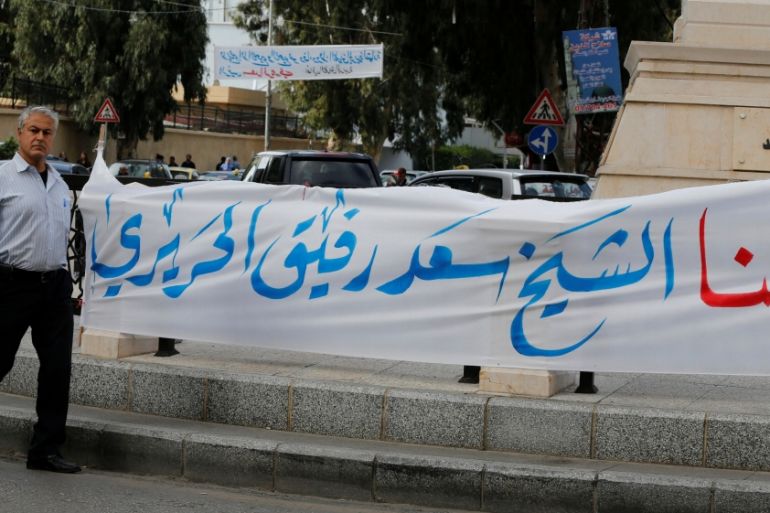Beirut on edge as political deadlock fuels uncertainty
Tension grips residents of Lebanon’s capital amid fears of escalation in regional divide between Saudi Arabia and Iran.

Beirut, Lebanon – A large banner hangs in between two buildings on a main road close to the centre of the Lebanese capital.
“The people of Tariq el-Jdideh are loyal, and our loyalty is only to Saad al-Hariri,” it reads, delivering a strong message of support for Lebanon’s ex-prime minister who on Saturday announced his sudden resignation in a televised speech from Saudi Arabia’s capital, Riyadh.
Five days on, such political posters keep springing up across the neighbourhood of Tariq el-Jdideh, a Beirut stronghold of the Sunni Muslim leader.
Hariri, who has not returned to Lebanon since his announcement, stepped down after only 11 months in office, implicitly blaming Iran and its main ally in the country, Hezbollah, for his decision.
The move has raised the risk of an open-ended political conflict, stoking fears of an escalation in the struggle for regional dominance between rivals Saudi Arabia and Iran. Previous attempts to weaken Hezbollah has led to violence.
‘Symbol of Lebanon’
In Beirut’s microcosm of regional politics, residents of Tariq el-Jdideh and of Hezbollah’s stronghold Dahieh attempted to make sense of the latest political developments.
“Can you believe that a prime minister is being held outside his country?” Jamal Chaqqif, a retired 60-year-old, told Al Jazeera while sitting at a cafe on one of Tariq el-Jdideh’s main traffic arteries.
|
|
On both sides of the political divide, the theory that Hariri may be under house arrest in Saudi Arabia has gained a large consensus. Hariri’s own entourage expressed doubt as to when he would return to Lebanon.
In the meantime, his supporters’ affection seems to be unfazed.
“The love for Hariri has increased,” said Chaqqif. “He is the symbol of the whole country.”
Hariri, who heads the Future Movement, gained political support after his father, Rafiq, was killed in truck bomb blast in Beirut in 2005. His critics, however, argue he is inexperienced and less charismatic than his father.
In Tariq el-Jdideh, many admit things have not been the same since Rafiq Hariri‘s murder, including social support for the Sunni community.
Yet, loyalty to the late leader and the lack of a credible alternative option, however, is widely seen as guaranteeing Hariri a large support base.
“We don’t have another Sunni leader,” said Bilal Issam, a 45-years-old jewellery owner in Tariq el-Jdideh, urging Hariri to return to Lebanon.
|
|
The constitutional process to appoint a new prime minister has been put on hold, and Lebanese government officials have said there will be no action taken until Hariri returns to the country.
But should things move forward, Lebanon would need to navigate the complicated reality of finding another Sunni prime minister – in accordance with the country’s constitution – who could weather the regional power dynamics.
Speculation over the possibility of a conflict fuelled by yet another political deadlock has loomed large. On Monday, Saudi Arabia ratcheted up the rhetoric, accusing Lebanon of having declared war against the kingdom because of what it described as “acts of aggression” committed by Hezbollah.
Looking out onto the street from the entrance of his shop, Issam said Tariq el-Jdideh had largely emptied out of fear something might happen. However, he says “no one knows” what that would be.
“They fear an Israeli strike, or a Saudi strike,” said Issam. “The problem is that you don’t know what is underneath all of this, what they [regional powers] are planning.”
Issam said, however, that another civil war is unlikely. “Who is gonna fight who? We [the Sunni Muslims] don’t have weapons, only Hezbollah has weapons. And to fight you have to be two,” he said.
‘Every one of us is Hezbollah’
Just a 10-minute drive away from Tariq el-Jdideh lies the neighbourhood of Dahieh, where Hezbollah’s headquarters are located.
Represented in government and parliament, Hezbollah is not just an armed group, but also a political party with strong popular support. In recent years, it has extended its influence beyond Lebanon’s borders, having sent forces to Syria to fight alongside President Bashar al-Assad’s troops.
In the speech delivered from Saudi Arabia, Hariri accused the Iran-backed party of having staged an attempt on his life last week, drawing a comparison with his father’s murder. Hezbollah called Hariri’s resignation a “Saudi-imposed decision”.
Despite Lebanon being increasingly divided along two camps, Dahieh residents – similarly to those of Tariq el-Jdideh – also see their leaders as being representative of the whole country.
“Hezbollah is not a party, it’s the Lebanese people,” 35-year-old Brahim told Al Jazeera. “We are dispossessed people, we have been fighting Israel every day. Every one of us is Hezbollah.”
The Dahieh resident, who did not want to disclose his full name, said the Shia community in Lebanon does not fear a potential war with Israel because of Hezbollah acting as a deterrent.
“Israel tried to wipe out Hezbollah in 2006 and did not manage,” he said, referring to a 34-day conflict that took place 11 years ago. “Now the party is even stronger than back then, after six years of war in Syria.”
Shortly after Hariri’s resignation, Israeli Prime Minister Benjamin Netanyahu called the development a “wake-up call to the international community to take action against Iranian aggression”, adding that Hezbollah’s empowerment “endangers not only Israel but the entire Middle East”.
But Nisrin Nasereldin, a 45-year-old journalist and Hezbollah supporter in Dahieh, said that a possibility of a military confrontation with Israel was distant, arguing that Tel Aviv would think twice before making such a move.
“Iran, Syria and Lebanon have formed one front in the region, far from terrorism,” she said.
However, Nasereldin said tension in the neighbourhood was palpable.
“Everyone talks, but no one knows what the likely scenario might be,” she said. “There is a general fear for the future of the region. Something is being cooked up outside the country.”